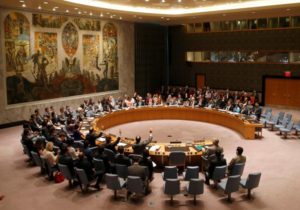 Security Council Accepts Truce Plan, No Vote, Little Discussion
Security Council Accepts Truce Plan, No Vote, Little Discussion
Click here to view the original article.
LAKE SUCCESS, June 2 (U.P.)-The United Nations Security Council acted without a vote and with a minimum of discussion today in asking its mediator to fix the deadline for a four-week truce in Palestine.
First Faris El Khoury of Syria, who took his seat today as Council president, notified delegates that the mediator, Count Folke Bernadotte, had proposed he be allowed to name the cease-fire deadline.
The grizzled Arab diplomat suggested the Council accept the Swedish mediator’s suggestion. American Delegate Warren Austin, who hailed the U. N.’s first real victory in the Palestine case, and several other members of the Council agreed with El Khoury.
El Khoury then said he assumed he was authorized to tell Bernadotte to go ahead, consulting with Arabs and Jews and then picking a cease-fire zero hour.
TWO ABSTENSIONS
Andrei Gromyko of Russia and Vassily Tarasenko of the Ukraine said they abstained from approving the suggested procedure. Neither, however, raised any obstacles to the program and it therefore left El Khoury free to send a cable to Bernadotte giving him authority in arranging an end of the fighting.
(Associated Press reported Soviet sources said Gromyko and Tarasenko did not take part because they had abstained from approving appointment of the mediator in the recent special U. N. Assembly on Palestine.)
An Israeli spokesman, disappointed that the cease-fire would not be put into effect immediately, said- “Once again we are put in a position where the Security Council virtually tells us to go on shooting.”
Israel Representative Aubrey Eban said he saw no reason for holding up an actual cease-fire.
SAVING OF LIVES
Eban said it was much more important to save human lives than aim for “technical perfection.” He said the Jewish force had three times hurt its military position by ordering its high command to stop fighting at a specific time if the Arabs did likewise. Three times, he added, the Arabs refused to go along.
Eban said Israel would not order another cease-fire until informed that the Arabs had previously done so.
(For the Arabs of Palestine, Jamal Husseini of the Arab higher committee, said, according to Associated Press, that the council took the only reasonable decision. He said it would be at least four or five days before the cease-fire could be made effective.)
The Arabs, in their acceptance of the cease-fire, said nothing today about Israel’s insistence that the roads to Jerusalem, now blocked by Arab troops, must be opened to civilian supplies during the month long truce.
EXPLANATION ATTACHED
Both sides have told the council they are ready to stop fighting but they both attached explanations that, for all practical purposes, amounted to sharply conflicting conditions and reservations.
The seven Arab states told the council today that-
1-Although they favor a four-week cease-fire period, Arab armies will resume hostilities if the State of Israel is not disbanded at the end of that time.
2-Potential Jewish immigrants already trained as fighters must be barred from the Holy Land during the truce period.
3-Arabs must be given a role, together with the U. N. mediator and U. N. Truce Commission in Palestine in the supervision of the cease-fire plan.
Britain acceded to one of the Israeli interpretations of the cease-fire terms when it agreed that the arms embargo should apply to British stockpiles now in Arab territory.